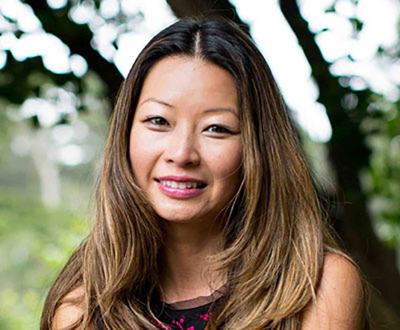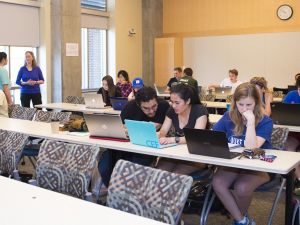New Faculty: Lisa Wu Wills adds expertise in architecture and application-driven hardware acceleration

Welcome to Lisa Wu Wills, Clare Boothe Luce Assistant Professor of Computer Science and Electrical and Computer Engineering. Solving computing problems that can arise with today’s big-data analytics, Wills is an expert in the interdisciplinary research of computer architecture and health care.
------
Lisa Wu Wills likes a challenge, especially when it comes to solving the computing problems that can arise with today’s big-data analytics.
An expert in computer architecture and analytics acceleration, Wills joined Duke in July as a Clare Boothe Luce Assistant Professor of both Computer Science and Electrical and Computer Engineering.
“A big reason I came to Duke is because of its world-renowned medical school and state-of-the-art genomics and health care-related research,” Wills said. “It’s a perfect fit for my interest in the interdisciplinary research of computer architecture and health care.”
Wills has jumped into her new roles with both feet. In addition to teaching the new CS/ECE 590: Computer Architecture and Hardware Acceleration course during the Fall 2019 semester, she is also establishing the APEX Lab@Duke, which will give Duke research scientists access to systems that will speed up their data analyses. The APEX Lab also hosts special events, such as the September 6 Chisel Bootcamp, which taught participants how to design hardware with Chisel, a Scala-embedded hardware language.
Research is also an important priority for Wills, and her focus is on application-driven hardware acceleration with the emphasis on the “application-driven” approach. “Understanding applications and how they execute on existing platforms is one of the most important steps before any meaningful computer systems research can begin, in my opinion,” she said. “Computer scientists are the experts in applications, and starting my work as a computer scientist and collaborating with computer scientists and engineers has been essential in accomplishing impactful results in hardware acceleration.”
Wills’ many specific research interests include computer architecture and microarchitecture, hardware-software co-designs, accelerators, and emerging-application domains. One of her key research objectives is to “simplify the design, deployment, and use of custom hardware,” she said.
Her current projects examine topics that include:
- Accelerating genomic analytics in the cloud
- A hardware-software accelerator-development framework
- Accelerating graph analytics using ASICs
- Accelerating database analytics using a database processing unit
“We are thrilled to have Lisa as a colleague because she is a real star in the field of computer architecture, and brings tremendous passion, intellect, and creativity to her research,” said Computer Science chair Pankaj Agarwal. “With joint appointments in Computer Science and Electrical and Computer Engineering, she will further strengthen the ties between the two departments, and both will benefit greatly from her research and teaching contributions.”
Wills came to Duke from UC Berkeley, where she served for three years as a postdoctoral researcher (electrical engineering and computer science) and taught a graduate course in computer architecture. Prior to her time at Berkeley, she served as an architect for Intel as well as a research scientist for Intel Labs.
Wills co-holds eight patents, has published a number of papers, delivered many invited talks, and served as a mentor to both graduate and undergraduate research students. She earned a doctoral degree in computer science from Columbia University and an MS in computer science and engineering from the University of Michigan. She also holds a BS in electrical and computer engineering from the University of Illinois, Urbana.
Wills hopes her work makes a difference at Duke and far beyond. “While I want my research to have long-lasting impacts, I also want to help students to realize and maximize their potential to be future industry leaders and academic researchers,” she said. “I plan to utilize my expertise in computer systems and hardware acceleration to advance research in health care and other natural sciences by helping scientists expedite their work and consequently improve human health.”




